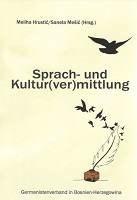Darstellung der Partikelkombinationen in ihrer Abfolge am Beispiel der Modalpartikel schon
Representation of the particle combinations in their sequence using the example of the modal particles
Author(s): Diana Ristivojević
Subject(s): Language studies, Theoretical Linguistics
Published by: Društvo germanista u Bosni i Hercegovini (DGuBiH) / Germanistenverband in Bosnien-Herzegowina (GViBH)
Keywords: German; particle combinations; modal particles; schon;
Summary/Abstract: This paper deals with the modal particle schon in German and its possible combinations with other particles in a concrete sentence realisation. In German, particles are specific and very complex parts of speech with the ability to form combinations in sentence realisation, which is their typical characteristic. Since their combinations are insufficiently researched, some of the possible combinations built by the particle schon will be illustrated and examined in this paper. The first part includes a theoretical framework in which it will be briefly pointed out what the most important about the particle schon is, and the combinations with other particles in which it is realised will bi listend and explained. In the second part of the paper possible combinations of the particle schon in specific examples of sentence realisations will be shown, that have been taken from the newspaper Frankufurter Allgemeine Zeitung. The paper also examines whether these combinations are realised according to certain rules. Since not all combinations are allowed, the author wants to investigate whether and in what way the distribution of particles in these combinations is conditioned or limited.
Book: Sprach- und Kultur(ver)mittlung
- Page Range: 127-140
- Page Count: 14
- Publication Year: 2022
- Language: German
- Content File-PDF

